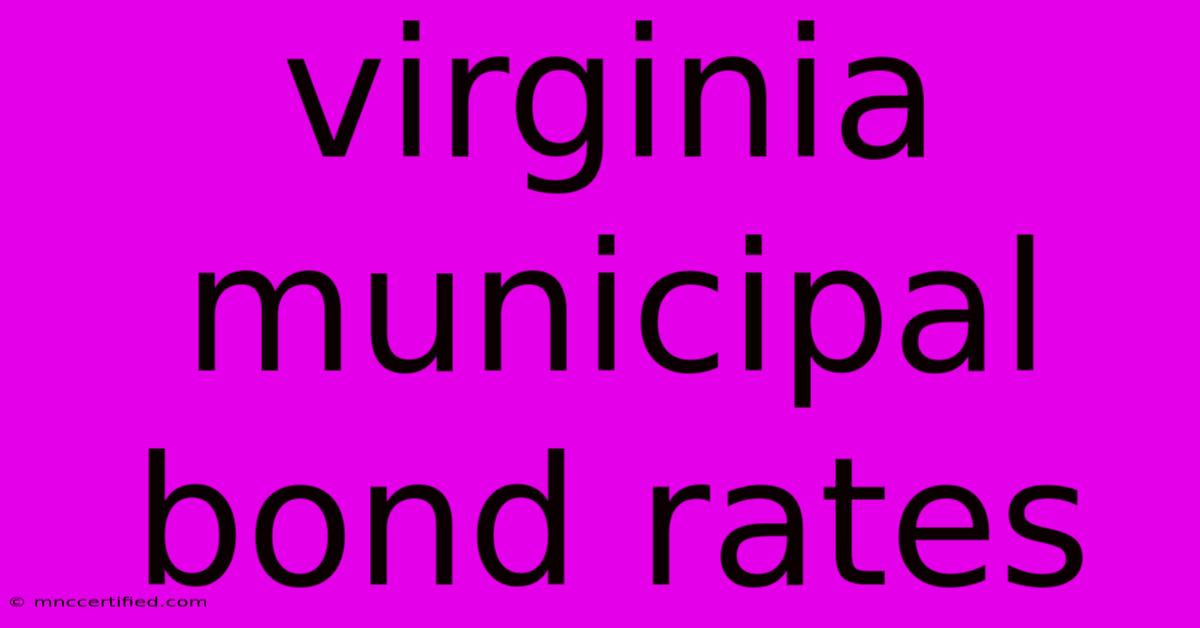Virginia Municipal Bond Rates

Table of Contents
Virginia Municipal Bond Rates: A Comprehensive Guide for Investors
Investing in municipal bonds can be a smart strategy for diversifying your portfolio and potentially generating tax-free income. Virginia, with its strong economy and diverse municipalities, offers a compelling market for these bonds. Understanding Virginia municipal bond rates is crucial for making informed investment decisions. This guide will delve into the factors influencing these rates, how to find them, and what you should consider before investing.
What are Virginia Municipal Bond Rates?
Virginia municipal bond rates represent the interest rate a municipality (city, county, or other local government) pays to investors in exchange for lending them money. These bonds are used to finance various public projects, including schools, roads, hospitals, and infrastructure improvements. A key advantage is that the interest earned on most municipal bonds is exempt from federal income tax, and often from state and local taxes as well, if you reside in Virginia. This tax-exempt status significantly boosts the after-tax return compared to taxable bonds.
Factors Affecting Virginia Municipal Bond Rates
Several factors influence the rates offered on Virginia municipal bonds:
-
Creditworthiness of the Issuer: The financial health of the issuing municipality is paramount. Stronger credit ratings from agencies like Moody's, S&P, and Fitch translate to lower interest rates (meaning a lower yield for investors) because investors perceive less risk. Conversely, municipalities with weaker credit ratings generally offer higher rates to compensate investors for the increased risk. Researching the credit rating of the issuer is a critical step before investing.
-
Market Interest Rates: Broader economic conditions and prevailing interest rates significantly impact municipal bond rates. When overall interest rates rise, municipal bond rates typically follow suit. Conversely, falling interest rates generally lead to lower municipal bond rates. Keeping an eye on the Federal Reserve's monetary policy is crucial for understanding these trends.
-
Maturity Date: The length of time until the bond matures affects its rate. Longer-term bonds usually offer higher yields to compensate for the increased risk associated with longer investment horizons. Consider your investment timeline carefully when choosing bonds with varying maturities.
-
Call Provisions: Some municipal bonds have call provisions, allowing the issuer to redeem the bond before its maturity date. Bonds with call provisions may offer slightly lower yields than those without, reflecting the issuer's option to repay early.
-
Demand and Supply: Like any asset, the demand for Virginia municipal bonds influences their rates. High demand can drive rates down, while low demand can push them up.
How to Find Virginia Municipal Bond Rates
Several resources can help you find current Virginia municipal bond rates:
-
Financial News Websites: Major financial news outlets regularly publish information on municipal bond markets, including rates for various issuers.
-
Municipal Bond Broker-Dealers: These firms specialize in trading municipal bonds and can provide you with up-to-date pricing and rate information. It is wise to work with a reputable broker-dealer with experience in the Virginia municipal bond market.
-
Bond Rating Agencies: Agencies like Moody's, S&P, and Fitch publish credit ratings and related information that can help you assess the risk associated with specific Virginia municipal bonds.
-
Electronic Municipal Market Access (EMMA): This is a comprehensive database of municipal securities information, including bond prices and details.
Investing in Virginia Municipal Bonds: Key Considerations
-
Risk Tolerance: While generally considered less risky than corporate bonds or stocks, municipal bonds still carry some level of risk. Consider your risk tolerance before investing.
-
Diversification: Diversifying your portfolio across different municipalities and bond maturities can help mitigate risk.
-
Liquidity: The liquidity of municipal bonds can vary. Some bonds may be easier to buy and sell than others.
-
Tax Implications: Remember to consult a tax advisor to understand the full tax implications of investing in Virginia municipal bonds, especially regarding state and local taxes.
Conclusion
Virginia municipal bonds can be a valuable addition to a well-diversified investment portfolio, offering the potential for tax-advantaged income. However, understanding the factors influencing rates, conducting thorough research, and seeking professional advice are crucial for making informed investment decisions. By carefully considering the information presented here, you can navigate the Virginia municipal bond market with greater confidence. Remember to always consult with a financial advisor before making any investment decisions.

Thank you for visiting our website wich cover about Virginia Municipal Bond Rates. We hope the information provided has been useful to you. Feel free to contact us if you have any questions or need further assistance. See you next time and dont miss to bookmark.
Featured Posts
-
November 28 This Day In History
Nov 28, 2024
-
Are Trader Joes Open Thanksgiving
Nov 28, 2024
-
Kittery Trading Post Gift Card
Nov 28, 2024
-
Toms Trading Network Survival
Nov 28, 2024
-
Bhattacharya Trumps Nih Nominee Anti Lockdowns
Nov 28, 2024